
Newsletter from
the UNESCO-PWRI No.2 November 2004 |
|
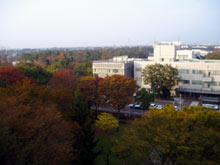
PWRI
in Autumn --What's in this issue--
-
-
-
Topics -A committee to discuss the current
trend of downpours- -JICA's new training course on "Flood Hazard Mapping"- -
|
1.
The 16th session of the IHP Intergovernmental Council The
16th session of the IHP Intergovernmental Council was held from September 20 to
24, 2004, at the UNESCO
H.Q. (Paris, France). (IHP
stands for International Hydrological Programme.) 
UNESCO H.Q. (Paris, France)At the conference, the future activities of
IHP were discussed. The establishment of a number of new UNESCO-IHP centers was
also taken up as a part of the reinforcement of relationships among international
organizations. On behalf of PWRI, Dr. SAKAMOTO, Mr. TAZOU, Mr. TERAKAWA and Mr.
KURIBAYASHI attended the conference and introduced the establishment project for
the International Centre for Water Hazard and Risk Management under the auspices
of UNESCO (UNESCO-CHARM) (tentative name), which is planned to be established
inside PWRI in autumn 2005, and organized various events to help the delegates
of the council understand more about the center. For the materials distributed
at the conference, please refer to 'Related Documents' on our
website.
(1) Presentation about UNESCO-CHARM
by Dr. SAKAMOTOAt the beginning of the second day's session,
Dr. SAKAMOTO made a presentation about UNESCO-CHARM. He explained the preparatory
activities which have been made so far, the planned activities of the center and
its future schedule. After his explanation, 25 countries
and 2 international organizations made comments to support the establishment of
the center. Dr. SZOLLOSI-NAGY, (Director of Division of Water Science and Deputy
Assistant Director General for Natural Sciences, UNESCO) and other participants
commented that this was the first time for them to see such overwhelmingly supportive
reactions. |
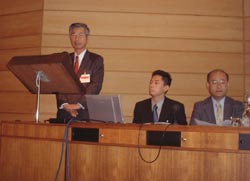 Presentation about UNESCO-CHARM by Dr. SAKAMOTO
Presentation about UNESCO-CHARM by Dr. SAKAMOTO
| 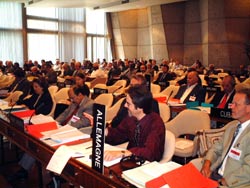 The Voice from the floor supported the
The Voice from the floor supported the
establishment
of the centre positively |
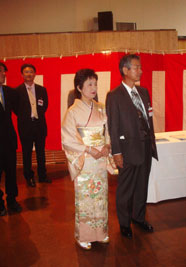
Dr. SAKAMOTO and Mrs. Fumiko
SAKAMOTO (2)
Reception hosted by PWRI After the first day's session,
Dr. SAKAMOTO, Chief Executive of PWRI, hosted a reception party. At the entrance,
Dr. SAKAMOTO and his wife, Mrs. Fumiko SAKAMOTO, warmly welcomed the participants.
About 250 people participated in the reception and they were satisfied with Japanese
foods such as Sushi, Tempura and Japanese sake. The reception was a great success. One
of the participants commented that this was the most impressive reception he ever
had in his 34-year-IHP activities. (3)
Side Event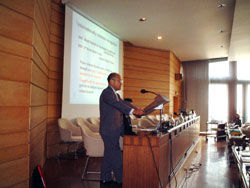
Presentation about UNESCO-CHARM by
Mr. TERAKAWA
During
a break time of the second day's session, we held a side event to inform the delegates
about the outline of PWRI's activities and the objectives of UNESCO-CHARM. In
the event, we made a video presentation about PWRI and Mr. TERAKAWA made a presentation
about UNESCO-CHARM. Each participant was served lunch and listened to the presentations
in a relaxed manner. We gathered 80 participants and held active discussions about
the research activities of the center and its staff recruitment. The 45 minutes
allocated to us for the side event including the 20-minute- presentation passed
too soon. |
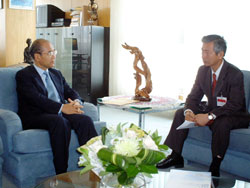
Conversation between Mr. MATSUURA,
Director-General of UNESCO, and Dr. SAKAMOTO
(4) Conversation between Mr. MATSUURA, Director-General
of UNESCO, and Dr. SAKAMOTO At
the first day, we visited Mr. Kouichirou MATSUURA, Director-General of UNESCO,
and had a conversation about UNESCO-CHARM among other things. Mr. MATSUURA stated
that they appointed 'WATER' as a priority area in the science sector of UNESCO
and made a commitment to strongly support the establishment of UNESCO-CHARM. -Epilogue-On
the final day, 21 resolutions were proposed and 6 were finally adopted, including
the establishment of UNESCO-CHARM. From now, we are going to carry forward necessary
procedures to get the approval of the UNESCO Executive Committee in spring 2005
and get the final and official approval from the 191 UNESCO member countries at
the General Conference scheduled in autumn 2005. Lastly,
we would like to express our deepest gratitude to Mr. IMAMURA (from MLIT, Japan)
and other Japanese staff members of UNESCO for helping us throughout the sessions. |
2.
Visit the UNESCO-IHEIn the afternoon of September
30, 2004, Mr. Terakawa and Mr. Ikeda visited the UNESCO-IHE (Institute for Water
Education) Office in Delft, the Netherlands. The UNESCO-IHE's predecessor, the
IHE Delft, established in 1957, was reorganized into a Category 1 center of UNESCO
in 2002. (Category 1 centers refer to organizations under the direct control of
UNESCO.) The reorganized UNESCO-IHE focuses on "Education, Training and Research"
and "Partnership Building and Networking" in the fields of water, and has established
strong project-based partnerships/ networks with the other international, regional
and national centres or institutes of the world. Also its alumni exceed over 12,000
in 120 countries. We were warmly welcomed by Prof. Richard Meganck, Director of
UNESCO-IHE and had a one-hour meeting. Then we looked around such facilities as
seminar rooms and laboratories. He expressed his strong willingness to collaborate
with a new UNESCO Center in Tsukuba in the future, and kindly proposed us to include
the preparatory activities for the new UNESCO Centre in the next UNESO-IHE newsletter,
which is now widely distributed all over the world. |
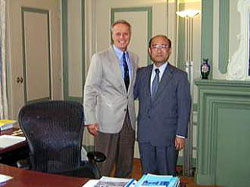 UNESCO-IHE (Delft, Netherlands)
UNESCO-IHE (Delft, Netherlands) | 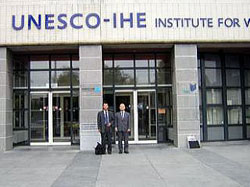 Prof. Richard Meganck, Director of UNESCO-IHE(Left)
Prof. Richard Meganck, Director of UNESCO-IHE(Left) |
|
3.
Topics - A Committee to discuss the current trend of
extreme rain events in Japan -
We have formed a committee in collaboration with the hydrologic engineering research
team consisting of specialists and administrative officials in the fields of meteorology
and hydrology to examine the current trend of extreme rain events in Japan. We
held the second committee meeting on November 4, 2004. This year Japan has so
far been hit by 10 typhoons, a new annual typhoon record. Those typhoons caused
extremely great damage in many regions of Japan. Although the media reports that
statistical data demonstrates an upward trend of the frequency of extreme events,
this phenomenon has a variety of interpretations depending on analyzed meteorological
data, definition of extreme event and time and spatial scales of consideration.
The target of this committee is to discuss freely different interpretations of
historical meteorological data between flood managers and meteorological services.
We will hold the third committee on December.
|
- JICA's new training
course on "Flood Hazard Mapping" - We
are preparing for the JICA's new training course on "Flood Hazard Mapping", to
be conducted in Tsukuba, Japan from January 25, 2005 to February 19, 2005. This
training course starts in fiscal 2004, as a regional-focused training course for
the East and Southeast Asian countries, and will accept 16 trainees (2 from each
country) each year for five years. It is aimed at mitigating flood damages in
the Asia monsoon region by providing technical managers and engineers engaged
in flood or river management in the public sector with the practical techniques
to produce flood hazard maps, and by enhancing their understanding of the map's
effectiveness. The curriculum will be composed of lecture courses, grouped field
exercises, and site visits to some municipalities and main river management offices.
The General Information has already been sent to each country through the JICA
offices. We are now recruiting trainees. |
4.
Recent activities and future scheduleConferences We AttendedInternational
Symposium on Living with Risks (Seoul, South Korea)
Date: September 20-23, 2004
Organizer:
WMO/UN-ESCAPTyphoon Committee
The objectives
of this Symposium include discussion on the progress of "Flood Hazard Map Project"
led by MLIT and Infrastructure Development Institute-Japan (IDI), and preparation
of a test hazard map in the actual field through "Town-watching". Mr. IKEDA from
the Secretariat joined the symposium to introduce a training course on "Flood
hazard mapping", which PWRI is now preparing for JICA to start from this fiscal
year. International Conference
on "Climate Change: a challenge or a threat forwater management"(Amsterdam, The
Netherlands) Date: September
27-29, 2004
Organizer: International Water
Association (IWA) Mr. IKEDA made a presentation
on "Flood management under the climatic variability and its future perspective
in Japan". During the conference, the outcomes of research and investigation related
to climate change and water resources were presented by the participants from
various countries, mostly from the Netherlands. The reported outcomes will serve
as a useful reference for the future activities of the new UNESCO Centre. The
first workshop with China Institute of Water Resources and Hydropower Research
(IWHR) Date: October 13, 2004
Organizer: PWRI, IWHR PWRI and IWHR
conducted a research collaboration agreement on February 2003 and started a joint
research project on flood management policy on the Chanjiang River. A hydrological
model developed mainly by PWRI has been used in a research project at IWHR. At
this workshop, assessments of the progress of these projects and discussion on
other possible collaboration areas were made. And it was agreed to start information
exchange with the International Research and Training Center on Erosion and Sedimentation
in Beijing, which is one of seven UNESCO-IHP centers. The
14th UNESCO-IHP Training Course (Kuala Lumpur, Malaysia) Date:
October 11-15, 2004 Organizer: UNESCO Jakarta Office and Nagoya University The
14th UNESCO-IHP Training Course was held in Kuala Lumpur, Malaysia hosted by the
Humid Tropic Center (HTC-KL). More than 40 professionals participated in the course
from Asia. This course was composed of two parts. The first one was a lecture
session where Mr. Ikeda made a presentation on the planning of the UNESCO-PWRI
Centre. In the second part, the lecturers and the participants of the past and
current courses reviewed the achievements of the UNESCO-IHP training courses and
made discussion to make the training courses more productive. The
12th Session of the WMO Commission for Hydrology (CHy-XII) (Geneva, Switzerland)
Date: October 19-29, 2004
Organizer: WMO Mr. TERAKAWA and Mr.
YOSHITANI participated in the 12th session of the WMO Commission for Hydrology
in Geneva as the Japanese delegation. About 150 professionals from 52 National
Hydrological Services and related organizations participated in this quadrennial
commission and discussed achievements of the past 4 years and activity plans for
next 4 years, including various international programs such as hydrological observation,
management of hydrological data and hydrological prediction. Coming
Events Open house of PWRI & NILIM, 'Civil
Engineering Day' November 20,
2004 9:30-15:00 (reception: until 14:00)
Place: Public Works Research Institute
(PWRI), Tsukuba, Japan PWRI is going to have
an open house in collaboration with NILIM (Ministry of Land, Infrastructure and
Transport National Institute for Land and Infrastructure Management). We would
like to offer you a good opportunity to become familiar with civil engineering
technologies. We plan to use a 'Rainfall Experience Car' (belonging to MLIT Kanto
Regional Bureau), so that you can experience heavy rain (from 10 to 300mm/hour).
You can also get nice presents if you join a stamp rally going around other experimental
facilities. Please come to our institute with your family. For
more information click here International
Conference on Water Sensitive Urban Design: Cities as Catchments
November 21-25, 2004
Place: Adelaide,
Australia This conference aims to explore the relationship between WSUD
(Water Sensitive Urban Design) principles and the sustainability of urban and
regional areas, to learn about recent experiences and to tease out the greatest
threats and opportunities that may be specific or common to particular urban settings.
Mr. YOSHITANI is planning to introduce the Water Master Plan of the Tsurumi River
in Japan as a successful case of integrated water resource management.
International Workshop "Water and Disasters"
December 13-14, 2004
Place: London, Canada
This workshop will provide an interdisciplinary environment to discuss a variety
of international, national and local initiatives aimed at minimizing the negative
impacts of water-related disasters. One of the sessions will be organized by the
Secretariat in cooperation with IFNet and JWF. The output of the conference is
going to be introduced at the conference in Kobe next January, see hereafter.
For more information click here
Updated Information of Our Website"Flood in Changjiang River
-Comparison between 1954 and 1998 floods-" -->Seminar
Report Announcement of next issue: The
next issue, to be published around January 2005, will introduce our research activities
such as WWAP (World
Water Assessment Program). |
6. Organization of ICHARM and new contact numberAt
the reorganization of PWRI on 6th March 2006, the Secretariat for Preparatory
Activities of UNESCO-PWRI Centre was removed, and the International Centre for
Water Hazard and Risk Management under the auspices of UNESCO (ICHARM) was established. The
centre consists of one Group (Water-related Hazard Research Group) and three Teams
(International Technical Exchange Team, Disaster Prevention Research Team and
Hydrologic Engineering Research Team). New contact numbers and e-mail addresses
are as follows:
Information:This newsletter is distributed
via e-mail. It can also be downloaded from PWRI's website. Those of you who wish
to subscribe or unsubscribe to our mailing list, please contact us by e-mail.
We welcome any comments or requests from you, via e-mail, for making this newsletter
more effective and informative one. Issued by: Secretariat
for Preparatory Activities of UNESCO-PWRI Centre, Public
Works Research Institute (PWRI)
1-6 Minamihara Tsukuba Ibaraki
305-8516, Japan
Tel : +81-29-879-6809 Fax : +81-29-879-6709
E-mail:
whrm@pwri.go.jp
URL: http://www.unesco.pwri.go.jp/ |
| | |





